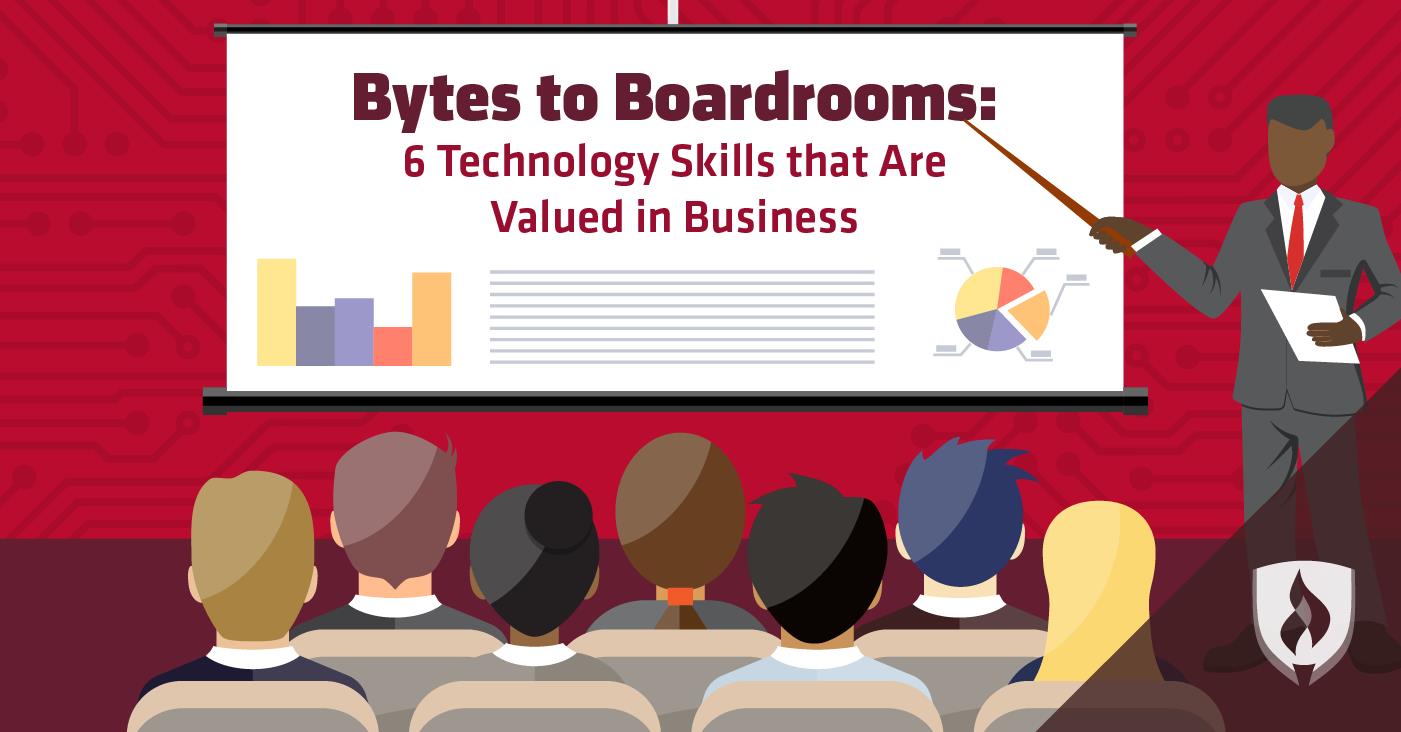
When you hear “business,” you may think of men and women in professional attire, holding meetings in vast conference rooms and pointing to charts full of data. While traditional business positions still exist—there’s still plenty of data and charts, the days of crunching numbers by hand and holding strictly face-to-face meetings are gone. Enter the era of spreadsheets, teleconferences and sophisticated scheduling software.
Technology has slowly seeped into what were before cut-and-dry fields. But now, with the advancements in software, computers and applications, traditional fields such as business are changing to integrate these innovations. As such, old jobs are changing and new jobs are emerging that combine both technology and business, leading employers to seek out candidates who have technology skills.
Maybe you are only beginning your career and trying to decide how to combine two of your passions, or maybe you are looking to change your career to something new and exciting. No matter what your position is, we talked to experts to find out some of the top technology skills businesses are looking for today. Now you can begin to brush up and hone your tech skills so you can stand out among the crowd and snag the career of your dreams.
6 Technology skills for business
1. Microsoft Office
You will be hard-pressed to find a professional job that doesn’t require interaction with at least one Microsoft product. No matter what your job is, it will help to have a basic understanding of products such as Word, PowerPoint and Excel. For the more data- and number-driven careers, a solid foundation in Excel is essential.
“Mastering Excel is a phenomenal way to get ahead,” says Alexander Pelaez, CEO of Five Element Analytics. “Every business uses it and as we collect more and more data, professionals are constantly asked to do more with Excel such as create dashboards with nice graphs, using VLOOKUPs and tables.”
2. Database knowledge
With the growth of big data, databases are becoming a critical component of many businesses. They are used to store large amounts of data, such as transactions and customer information. Databases are useful because they can store millions of records with easy quality control, provide advanced querying and can accommodate multiple users (unlike Excel, which is better for single-user, small-scale use).
“Being able to analyze data in an effective manner is crucial for nearly any job. Whether it’s in customer service, sales, product design or marketing, taking big data and turning it into applicable knowledge is an immensely useful skill,” says Reagan Toal, marketing manager at Federal Brace.
3. SQL
Going hand in hand with database knowledge is the knowledge of the language SQL. SQL, or structure query language, is the top choice when dealing with databases. With knowledge of SQL, you are able to update, retrieve and manipulate data through statements and commands.
"The business world can no longer operate without technology. Period."
“We strongly recommend that you learn SQL to enable you to use almost any relational database such as MySQL and Postgres, but if you know SQL, then you will be able to navigate Oracle and others as well,” Pelaez says. SQL is one of the most popular languages used for working with databases, so no matter what software your company uses, there’s a good chance that knowing SQL will come in handy.
4. CRM software
“From my experience, the most common technology used in business are CRM systems,” says Brad Shaw, CEO of Dallas Web Design. “CRM is marketing technology software that manages customer relationships.”
CRM, which stands for customer relationship management, helps businesses keep track of customers and sales through software. Common CRM software includes Salesforce and Hubspot. These software platforms allow businesses to create lists, sort through clients easily and keep tabs on leads and sales opportunities. CRMs are used for both B2C (business to client) and B2B (business to business) functions, so being familiar with at least one CRM software will help tremendously.
5. Programming languages
While you don’t necessarily have to be a programmer, says Pelaez, knowing the basics of programming languages can help you problem solve everyday issues including sorting through data or automating and simplifying a process. He recommends languages such as Python or Java because of their accessibility and use across many platforms.
Business professionals who know one or more programming languages immediately stand out among the crowd. Even if it’s as simple as knowing the basics of HTML to run a company blog or make changes to your business’ website, these skills are invaluable. Aside from the technical uses of languages, they also teach softer skills that are needed in a field as fast-paced as business. Knowing how to problem solve and think analytically are skills needed to be successful in both programming and in business.
6. Cloud computing tools
Cloud computing refers to the storage and retrieval of data over a network of servers hosted on the internet. It is one of the fastest growing technologies, with cloud computing spending expected to increase at six times the rate of overall IT spending from 2015 through 2020.
“All business professionals should be well versed in using cloud-based productivity tools at a minimum,” says Brandon Crossley, CEO of Poindexter. “Cloud-based tools allow teams to collaborate at lightning speed, and they democratize the availability of information across functions ... Sales, accounting, marketing, administration, operations, customer service and project management all live in the cloud now.”
Why are technology skills more important than ever?
“The business world can no longer operate without technology. Period. The world is simply becoming much more connected; therefore, competitive,” says Jonathan Rodriguez, CEO of BitMar Networks.
As technology dominates more and more industries, it’s time to look to the future and plan accordingly. You know which skills you need and how you can stay ahead of the game. But did you know that there are also new jobs emerging that will be in need of skilled professionals who have both business and technology skills? Learn more about these jobs and how you could combine your interests to join one of the fastest-growing industries in our article, "6 High-Demand Hybrid Jobs That Straddle Business and Technology."
RELATED ARTICLES:




